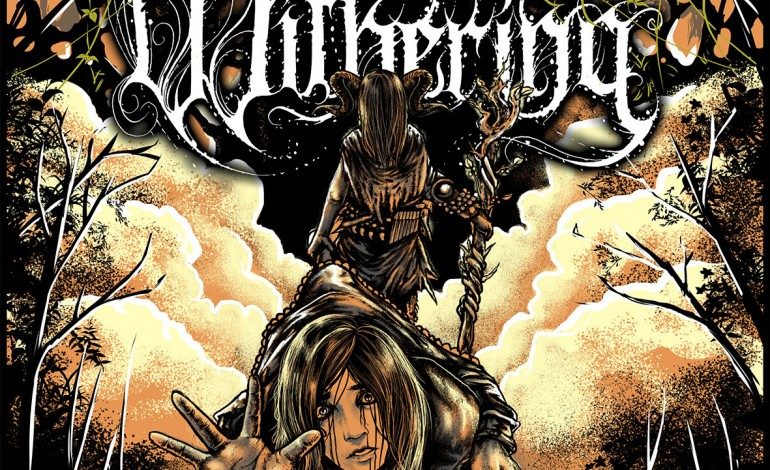

Maximalism Run Amok
Ovid’s Withering are a five-piece metal outfit from Tampa, Florida. A quick listen or web search will reveal that band are definitely “modern metal.” This is a fraught term – nebulous in meaning, and perhaps reductive or derogatory, depending on context. In Ovid’s case, there is no reason to be reductive or derogatory, as the band have a lot to offer musically. However, the band do indulge in many of modern metal’s trends. In terms of their place in “the industry,” the band certainly seem to be flirting with the scene (it’s remarkable what one can glean from a metal band’s font these days), but they don’t seem to be of the scene. Scryers of the Ibis is the band’s flagship full-length debut, initially self-released in November 2013 and reissued in March 2015.
Reissues usually have certain goals. These include convincing listeners that they missed something truly noteworthy, triggering nostalgia about music from an earlier period in fans’ lives, allowing critics to gush with the benefit of hindsight, and drumming up new and old fanbases for reunion shows or albums.
Ovid’s reissuing seems less loaded. Since the band self-released at first, this just looks like a go at wider exposure and availability for Scryers, which is a sprawling, intensive concept album. A tremendous amount of work must have gone into the composition and recording of it – the mix sounds great, and this is definitely not a remaster. What young band wouldn’t take advantage of a second chance to expose potential fans to their heartwork? Unfortunately, where the album sprawls, brevity and focus suffer. The 73 minutes of pummeling and stylistic caprice that make up Scryers will leave most listeners too exhausted to scry anything beyond their bedtime.
“Earthshaker I” is an onslaught of complexity that indicates what the album will encompass: Death blasts, growls and screams, baritone djent grooves, fantastical symphonic synths, tech-death guitar twiddles, bellowing deathcore breakdowns, dubstep stutters, and more! These techniques and signifiers are thrown about willy-nilly, appearing anywhere and everywhere. While the variety and unpredictability are not unwelcome, this approach contributes to one of the album’s flaws – that all of the songs kind of sound the same. They possess few real landmarks and struggle to stand out on early listens. Great concepts albums in the progressive tradition have used variety to great advantage. Quiet songs, fast songs, songs showcasing one member or another, rising and falling action – in a word, distinction. These are important tools in imparting an album with narrative flow and musical texture, and in enticing listeners to listen to the whole thing. Meanwhile, Scryers is an album bloated with too many loud and interchangeable parts. Two-minute symphonic interlude “The God of Shepherds and Flocks” is too little, and comes far too late.
Ovid’s Withering are firmly committed to the symphonic sound. This is a double-edged sword on Scryers. When Aaron Rodriguez’s arrangements work, the music becomes epic, emotional and huge. The trouble lies in the lack of restraint. The symphonies are a near-perpetual presence, and their effect is a denaturing of the heavier styles. The djent and deathcore syncopations just don’t punch like they would if were they unadorned, and valuable musical contrast is lost. There are about 14 seconds of unadulterated djent brutality at 5:37 of “The Reckoning. The Summoning. The Purge.” and dammit if that isn’t the heaviest, most exciting part of the whole album. Conversely, it would be a noble and rewarding thing for the Withering to craft their panoramas without leaning so heavily on the symphonic crutch. The lightly-synthed, guitar melody-rich coda of “Murder to Dissect” attests rather beautifully to their ability on this score.
If you aren’t immediately hooked on Scryers you will struggle to slog through its immense and tangled length. “Acheron” is about where the wall hits, and thereafter the finish line seems to recede into eternity. The album contains plenty of interesting rhythms, dramatic lyrics and vocals, passages of crushing heaviness, and even a few very lovely moments, but with all the bouncing around between styles, these gems tend to get buried deep within convoluted labyrinths of songwriting.
But for some, being beaten about the head with closely related but ultimately distinct ideas for an extended period of time isn’t so bad – people still read Atlas Shrugged, after all. However, the barriers to entry here are formidable – Ovid’s Withering are obviously skilled and ambitious, but display little finesse on Scryers of the Ibis. Tighter, more memorable albums will result if the band simply rein in their excesses – but do they really have a reason to? The modern metal (djent, deathcore, metalcore) circles Ovid’s Withering have appeal in are not sticklers for authenticity, elegance, or any of grandpa’s other quaint ideas about heavy metal. In this sense, Ovid’s Withering have a decision to make: whether they are content to churn out impressive but patently flawed albums like Scryers of the Ibis and ride the mall metal wave all the way to the djentcore festival, or whether they want to create something that will speak the universal language of quality, and bring in heavy metal fans of every spot and stripe.
